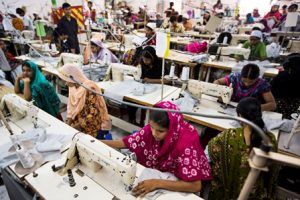Business and Human Rights: 10 Years of an Arduous Journey
Implementing UNGPs and developing a roadmap for meaningful action in countries require recognising the critical gaps in awareness among policymakers and civil society, and addressing them.
The ‘Guiding Principles on Business and Human Rights’ (UNGPs) provide guidance for the implementation of the United Nations’ ‘Protect, Respect and Remedy’ framework contributing to higher levels of accountability and awareness within corporations. The UNGPs intend to avoid the negative impact of business activities on the lives and livelihood of the people at large.
and awareness within corporations. The UNGPs intend to avoid the negative impact of business activities on the lives and livelihood of the people at large.
It was on 16 June 2011 that the first framework to define the corporate responsibility to respect human rights providing an authoritative global standard for addressing the risk of adverse human rights impacts linked to business activity came in. The framework succeeded in building and creating reasonable consensus than any previous attempt to create a binding treaty. Further, they also provided enough conceptual and operational clarity to the two human rights principles, which were championed by the UN Global Compact. Despite the wide acceptance of the Principles, which were endorsed by the United Nations Human Rights Council (UNHRC), and have been widely acclaimed by states, the European Union, international organisations, corporations and their representative organisations, the road to their implementation is fraught with immense challenges. At the same time, it needs mention that over the last 10 years, the business and human rights agenda has progressed significantly.
Benchmarking Principles
The UNGPs consist of three pillars—States’ duty to protect human rights, corporate responsibility to respect human rights, and access to effective remedies. They have facilitated the socialisation of human rights norms among business enterprises. The principles turned out as prerequisites to ensure corporate respect and corporate accountability for human rights. Despite some progress, there is much to be desired for at the ground level. A 2018 report of the UN Working Group on Business and Human Rights (UNWGBH) concluded that “the majority of business enterprises around the world remain unaware, unable or unwilling to implement human rights due diligence as required of them in order to meet their responsibility to respect human rights”.
The Principles call upon the national governments to observe and adapt the following in recognition of: a) States’ existing obligations to respect, protect and fulfil human rights and fundamental freedoms; b) The role of business enterprises as specialised organs of society performing specialised functions, required to comply with all applicable laws and to respect human rights; and c) The need for rights and obligations to be matched to appropriate and effective remedies when breached.
The above Principles apply to all States and to all business enterprises, including transnational and others, regardless of their size, sector, location, ownership and structure. Further, they should be understood as a coherent whole and should be read, individually and collectively, in terms of their objective of enhancing standards and practices with regard to BHR thereby helping to achieve tangible results for affected individuals and communities, contributing to a socially sustainable globalisation.
The guiding principles are not creating new international law obligations, or limit or undermine any legal obligations of any State.
Further, the Principles call upon the states to ensure that they are implemented in a non-discriminatory manner, with particular attention to the rights and needs of, as well as the challenges faced by, individuals from groups or populations that may be at heightened risk of becoming vulnerable or marginalised, and adding that due regard to the different risks that may be faced by women and men should be considered.
Going beyond the general principles, the foundational principles ground the state duty to protect human rights and state as follows: a) “States must protect against human rights abuse within their territory and/or jurisdiction by third parties, including business enterprises. This requires taking appropriate steps to prevent, investigate, punish and redress such abuse through effective policies, legislation, regulations and adjudication”; b) “States should set out clearly the expectation that all business enterprises domiciled in their territory and/or jurisdiction respect human rights throughout their operations.”
For purposes of raising awareness and promoting greater understanding of the Guiding Principles among various stakeholders, several relevant materials have been translated into local and regional languages, printed and disseminated, namely, the Guiding Principles, FAQ about the Guiding Principles, and Interpretive Guide on Corporate Responsibility to Respect Human Rights.
Also Read : Havoc of Gas Leaks: India Must Work on Business and Human Rights
National Action Plan and Mandatory Due Diligence
Safety and health at work, living wages, the right to freedom of association or the prohibition of child and forced labour, the protection of indigenous peoples’ rights and the protection of the environment are examples of some human rights standards. By means of introducing the National Action Plan (NAP), the core elements of human rights due diligence are to be incorporated into the business processes.
With the overarching principles in place, many European countries are going for mandatory human rights due diligence to ground their implementation. France and the UK have come out with laws, while proposals for mandatory human rights due diligence are catching up in Germany and Switzerland. The United States too has been working (or committed) to introduce mandatory human rights due diligence laws. All these will lead to a transformation in generally viewing human rights under the garb of corporate social responsibility (CSR) by companies. Governments are, though in a limited way, are taking a further step by seeking to mandate audits and compliance programmes for companies. In 2016 the German government adopted a NAP for BHR that outlined expectations wherein companies need to adhere to the obligations and responsibilities as stipulated in the UNGPs. Further, it promised to introduce legislation to regulate corporate due diligence in supply chains if, more than 50 per cent of German companies with 500+ did not meet NAP requirements voluntarily by 2020. Although business associations warned that a law could result in distortion of competition and create detrimental effects for German enterprises, especially Small and Medium Enterprises (SMEs), in the international market, the government committed itself to Supply Chain Draft Law, which provides measures to prevent potentially adverse effects on human rights that are expected to be reasonable and proportionate given the company context, risk probability, and potential impact. The draft Supply Chain Law is based on the requirements of the UNGPs and the OECD Guidelines for Multinational Enterprises. A Supply Chain Law would place mandatory legal obligations on companies based in Germany with more than 500 employees to ensure that social and ecological standards are observed through all tiers of the value chain. Further, suppliers from developing and emerging countries are also required to comply with them. It is expected that the proposed law would be in place this year.
Since 2011, the UN Human Rights Council, the European Union, the Council of Europe, the Organization of American States, the G7, the G20, national human rights institutions and business associations have encouraged states to develop national action plans on business and human rights. NAPs articulate state’s priorities and actions to implement the UNGPs. Since the adoption of the UN Guiding Principles in 2011, 24 states have produced NAPs. While the UK and the Netherlands were the first countries to adopt and launch NAPs in 2013, Japan has been the last country to launch it in October 2020. The UK also updated its NAP in May 2016. Georgia, South Korea and Mexico have included a Business and Human Rights chapter in their NAPs. India, Pakistan and other 24 countries are in the process of developing or have committed to developing NAP.
India’s Zero Draft of NAP
India’s Ministry of Corporate Affairs released a Zero Draft of the NAP in 2018. According to the ministry, “a country’s NAP is expected to demonstrate how these principles are already being implemented, what the gaps are, and how they shall be addressed.”
As per the Zero Draft, the following have been recommended as key contents for an NAP: Section 1: Statements of commitments to implement the UNGPs; Section 2: Background and context to the NAP. How the NAP relates to other existing Government policy strategies such as national development plans, CSR strategies, national plans implementing International Labour Organisation convention and recommendations; Section 3: Government’s expectations from businesses, including expectations that businesses respect human rights throughout their operations based on UNGPs and other guidance documents; Section 4: Government response clarifying how it currently addresses adverse business-related human rights impacts and outline commitments for further activities.
The most important part of the Zero Draft is its statement of commitment and an indication of the future course of action.
Further, the Indian government has revised the National Voluntary Guidelines on Social, Environmental and Economic Responsibilities of Business, 2011 (NVGs) and also released as National Guidelines for Responsible Business Conduct (NGRBC) in 2018 to align with the UNGPs and Sustainable Development Goals (SDGs). It needs mention that India has some significant CSR initiatives already, including the section 135 of the Companies Act, 2013, NVGs and directions by the Securities and Exchange Board of India (SEBI) to top 1000 listed companies to prepare annual business responsibility report.
The Road Ahead
There has been widespread recognition and agreement that businesses have a key role to play in addressing social inequality, economic exclusion, and climate change. Although there have been several examples of businesses conducting themselves responsibly during the global pandemic COVID-19 by respecting labour rights, others have resorted to cost-cutting and ignored human rights standards of their workers.
Also Read : COVID-19: Business and Human Rights in the Spotlight
An NAP becomes more relevant in the wake of COVID-19 in that the pandemic has exposed several systemic vulnerabilities in how businesses operate.
Lakhs of informal sector migrant workers in India are the worst hit, as they were thrown out of work without food, shelter, and any means of social protection. The International Labour Organization (ILO) estimated that 400 million workers are at risk of sinking even deeper into poverty. The fragility of global supply chains exposed by the COVID-19 pandemic, as well as the extreme vulnerability of many of the people working in them and the informal sector, could increase demands from trade unions and civil society organisations for legislation for better human rights protection.
The momentum for corporate accountability has led United Nations Development Programme (UNDP) to develop a Global Initiative on Business and Human Rights, which aims to expand its work in Asia, Africa, Arab States, Latin America and Eastern Europe and Central Asia. As part of this Global Initiative, UNDP is collaborating with the UN Working Group on Business and Human Rights to tackle major social and economic issues from a business and human rights perspective in partnership with governments, corporations, civil society, trade unions and other stakeholders. Climate change and environmental degradation are priority segments under this initiative as industries most responsible for climate change and environmental degradation are regularly implicated in severe human rights abuses, including forced labour and child labour. Implementing UNGPs and developing a roadmap for meaningful action in countries require recognising the critical gaps in awareness among policymakers and civil society, and addressing them.
